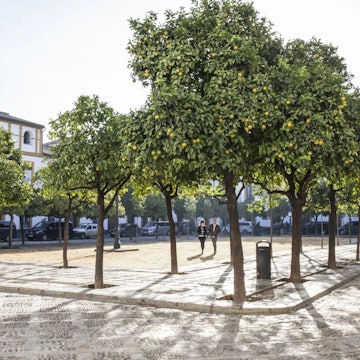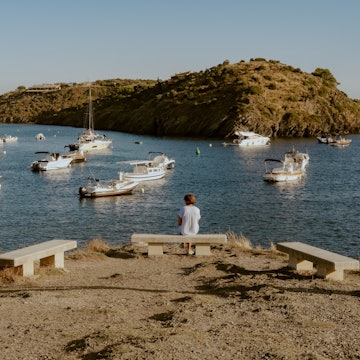

Exploring Puente la Reina, a town through which the Camino de Santiago passes in Spain. Brester Irina/Shutterstock
You've booked your flight and made a list of everything you plan to see, do and eat in Spain. The only thing left to do is pack!
Rather than an item-by-item checklist, we've put together this practical guide to help you create your own packing list. Along with the obvious things (your passport, phone, money, medicine and toiletries), this is what you should know to figure out what to bring and what to leave behind.
Before we jump into the list, one word of advice: pack light. It'll be much easier to navigate trains, planes and cobblestone streets. Plus, you want to make sure you leave room for souvenirs (or pack an expandable bag you can check later).

What kind of dress code should I expect?
Pack smart casual clothes and keep your beachwear for the beach. Avoid athleisure wear, beachwear or excessively revealing clothing in cities and make sure to bring comfortable walking shoes.
Spain is packed with outdoor adventure, so if your itinerary includes heading out into nature, bring suitable footwear, as well as jackets and hats. If you're visiting religious sites such as churches, cathedrals or mosques, cover your shoulders and knees. It's not just about respecting the space – in many places, they will deny you entry if you are not dressed appropriately.
If you're attending an event, bear in mind that Spaniards like to dress up, and outfits for important occasions such as weddings and ferias are usually on the fancier side.

Seasonal information about what to pack
If you're traveling anytime before mid-June, make sure to pack a jacket. You may be picturing sun-drenched beaches as you pack, but Spain has more colder seasons in the year than warm. Expect cooler weather during early spring (March to May), autumn (September to November) and winter (December to February).
If you're headed to northern Spain, such as the Basque Country, Asturias and Galicia, expect cooler temperatures compared to the rest of the country and pack some layers. Here's what to expect by season:
Summer: Pack light, breezy clothes if you're traveling during the hot summer months. However, regional variations can bring surprises. For instance, even in summer, northern Spain can see cooler evening temperatures. Pack an extra evening layer just in case it gets a bit chilly at night.
For the beach, pack swimwear, short sleeves, sandals and a beach hat for the sun (you may see locals with a handheld fan). Beachwear is reserved for the beach, so make sure to plan an appropriate change of clothes if you plan to head back into the city.
Autumn: Rain isn't uncommon in autumn (beginning in October), so pack a jacket for possible downpours. Expect cooler weather and pack a jacket for the evenings.
Winter: Spain does get cold during winter (especially in the hills and the north). Many homes are built for warmer months, which means you might be chilly even if you are inside. One cozy hack? Pack some wool or warm socks to protect your feet from the tile floors.
As expected, you'll need warm clothes, layers and a coat, so make sure to pack for the chillier weather.
Spring: Spring can bring rain showers, so bring a folding umbrella and a jacket in March and April. Pack layers to be prepared for the changing seasons.

What converters should I bring for electrical outlets?
Spain uses the two-pin continental plugs typical throughout mainland Europe. In Gibraltar, both these and the three-square-pin plugs from the UK are used, though the latter is more common. Adapters and charging cables are readily available in all but very small towns.
Pick up cash when you arrive
Most places accept cards, but do carry some cash for the few holdouts. Either bring some cash to exchange or make a stop at the ATM (you'll likely get a better exchange rate at the ATM). As for tipping, it's not customary in Spain, so a couple of euros should suffice.
















